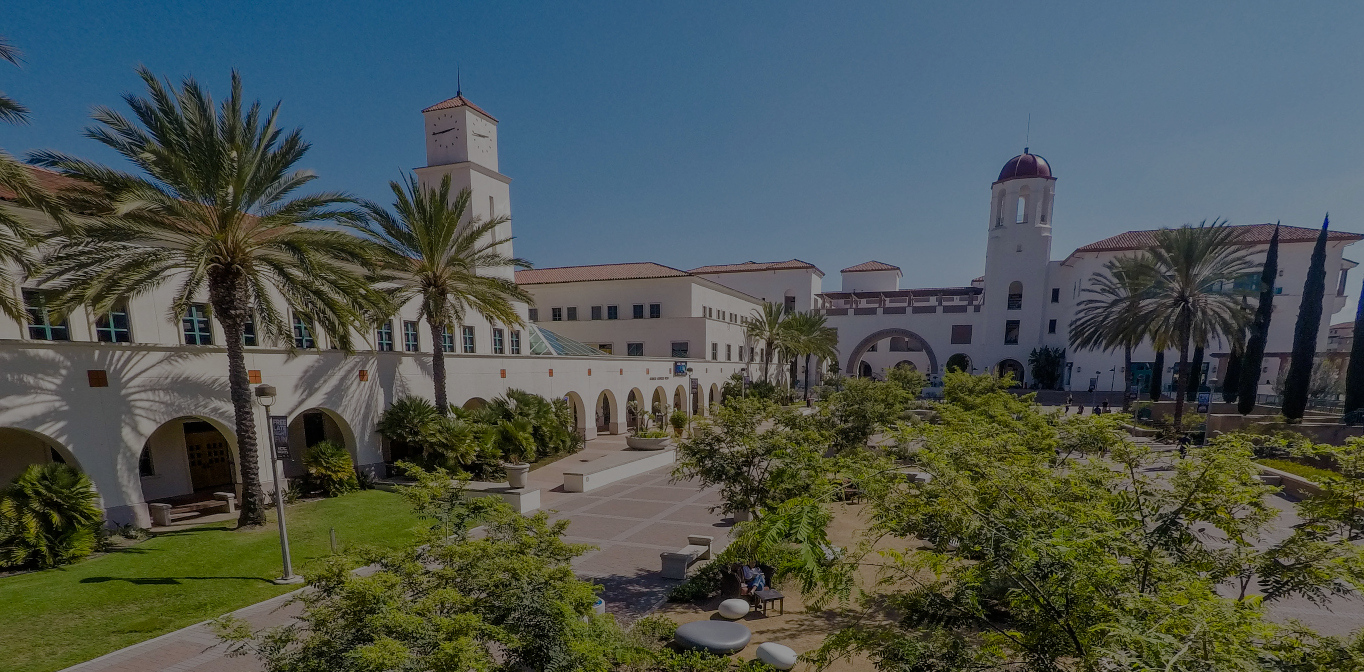Facts, Mission and History
Quick Facts:
- Founded: 1897
- Alumni: 500,000+
- Students (for fall 2024): more than 39,000
- Faculty & Staff: 6,890
- Degree Programs: Bachelor’s degrees in 97 areas, nearly 90 master’s degrees in 80 fields and 25 doctoral degrees (Ph.D., Ed.D, Au.D. and D.P.T.)
- No. graduating (May 2024): nearly 12,000
- Research classification: R1 research institution
- Annual Research: nearly $230 million
- Athletic Teams: 18
- Undergraduate Applicants (for fall 2023): more than 110,000
- Current President: Adela de la Torre, Ph.D.
Mission
The mission of San Diego State University is to provide research-oriented, high-quality education for undergraduate and graduate students and to contribute to the solution of problems through excellence and distinction in teaching, research, and service. The university strives to impart an appreciation and broad understanding of the human experience throughout the world and the ages. This education extends to diverse cultural legacies and accomplishments in many areas, such as the arts and technology; the advancement of human thought including philosophy and science; the development of economic, political, and social institutions; and the physical and biological evolution of humans and their environment. San Diego State University pursues its mission through its many diverse departments and interdisciplinary programs in the creative and performing arts, the humanities, the sciences, and the social and behavioral sciences.
SDSU Diversity Statement
At SDSU, our diversity gives us power and benefits every single member of our community. Consistent with California law and federal civil rights laws, SDSU provides equal opportunity for all in education and employment. We encourage all members of our community to purposefully learn from one another through open and respectful dialogue and responsible engagement. We strongly preserve the right to free expression and encourage difficult conversations that help lead to improved individual and community learning and cohesion.
History
San Diego State University is the oldest higher education institution in San Diego.
Since its founding in 1897, the university has grown to become a leading public research university. SDSU has officially been classified as an R1 research institution, the highest distinction given to doctoral universities in the Carnegie Classification of Institutions of Higher Education. It is also a federally-designated Hispanic-serving Institution as well as an Asian American and Native American Pacific Islander-Serving Institution (AANAPISI). SDSU provides more than 39,000 students with the opportunity to participate in an academic curriculum distinguished by direct contact with faculty and an international emphasis that prepares them for a global future.
In The Beginning
Serving the San Diego region has always been a core part of SDSU’s mission.
Founded March 13, 1897, San Diego State University began as the San Diego Normal School, a training facility for elementary school teachers. Seven faculty and 91 students met in temporary quarters over a downtown drugstore before moving to a newly constructed 17-acre campus on Park Boulevard.
The curriculum was first limited to English, history and mathematics. Course offerings broadened rapidly under the leadership of first president, Samuel T. Black, who left his position as state superintendent of public instruction to become the new school's first president. Black served from 1898 to 1910.
From 1910 to 1935, SDSU President Edward L. Hardy headed a vigorous administration that oversaw major changes to the fledgling institution. In 1921, the Normal School became San Diego State Teachers College, a four-year public institution controlled by the state Board of Education. In that same year, the two-year San Diego Junior College, forerunner of today's local community colleges, became a branch of San Diego State Teachers College. That union lasted until 1946.
1931 Relocation
By the 1920s, the college was already beginning to outgrow its Park Boulevard location, and San Diegans launched a campaign to build a new campus on the city's eastern border.
In February 1931, students, faculty and staff moved into seven buildings surrounding a common area still known as the Main Quad.
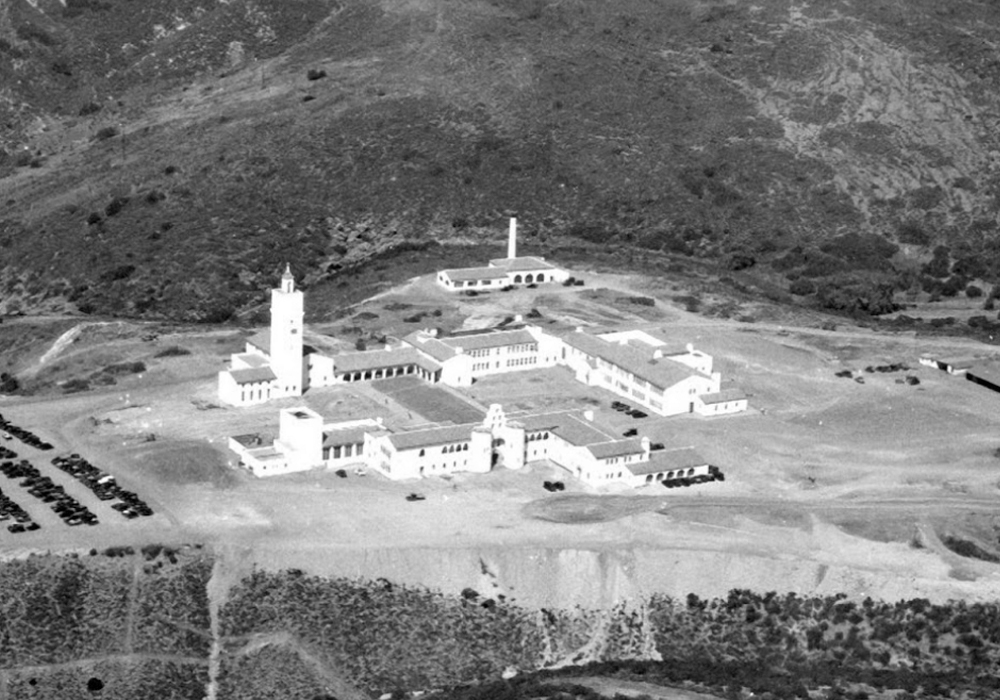
Four years later, the state Legislature authorized expansion of degree programs beyond teacher education, and San Diego State Teachers College became San Diego State College. In 1935, Walter R. Hepner took the helm as SDSU president, beginning a 17-year tenure.
The college continued to grow over time, reaching an enrollment of more than 25,000 students during the administration of Malcolm A. Love, who served as president from 1952 to 1971. The SDSU Library is named after Love.
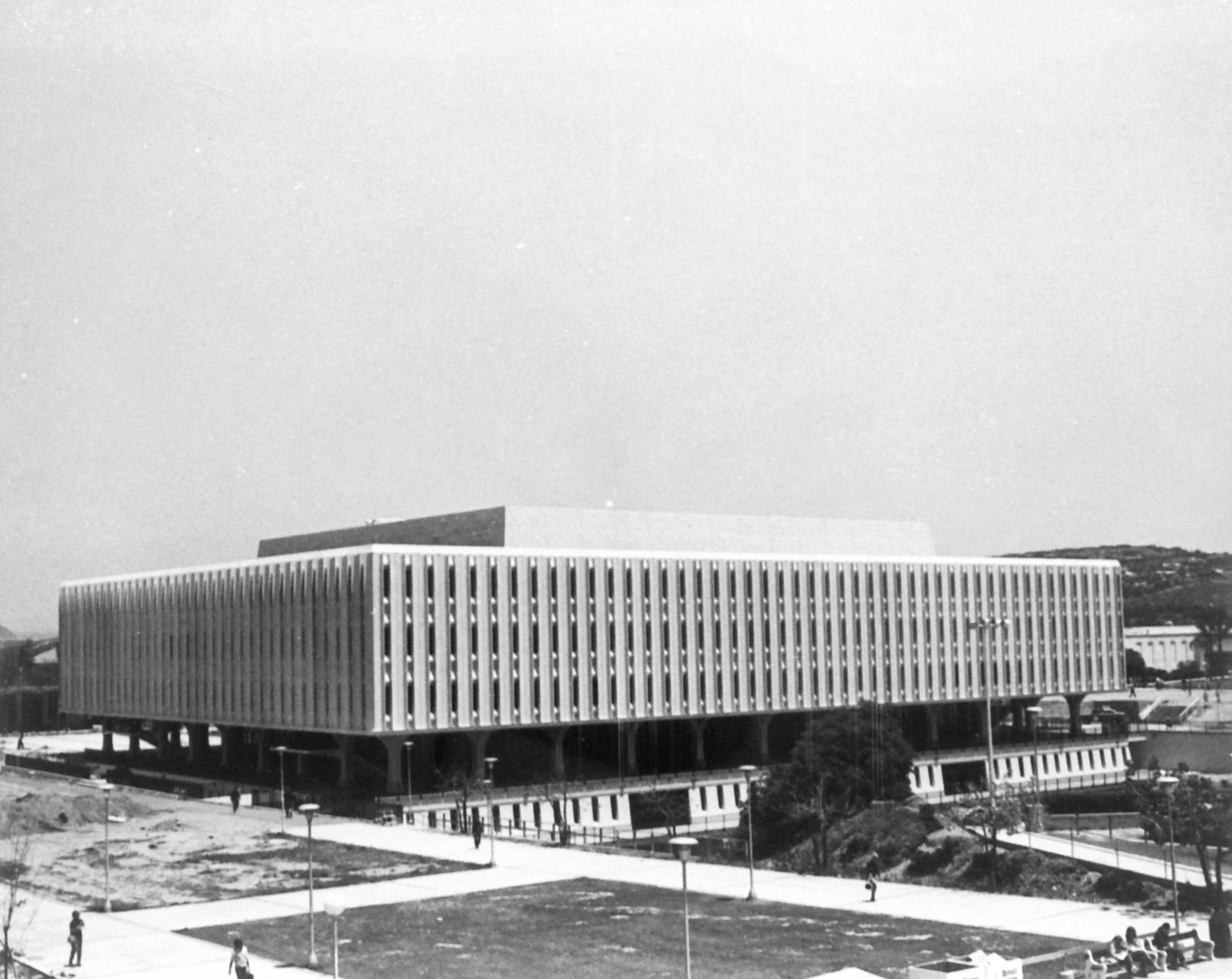
In 1959, what is now known as SDSU Imperial Valley was founded on the original site of the first Calexico High School. Originally known as the Imperial Valley Campus, its name was officially changed to SDSU Imperial Valley in 2018 by President Adela de la Torre with the support of Dean Gregorio Ponce and the approval of the University Senate.
In 1960, San Diego State College became part of the newly created California State College system, now known as The California State University system.
In 1963, just months before he was assassinated, U.S. President John F. Kennedy gave the commencement address at San Diego State College. President Kennedy received the university's first honorary doctorate – also the first in the CSU system.
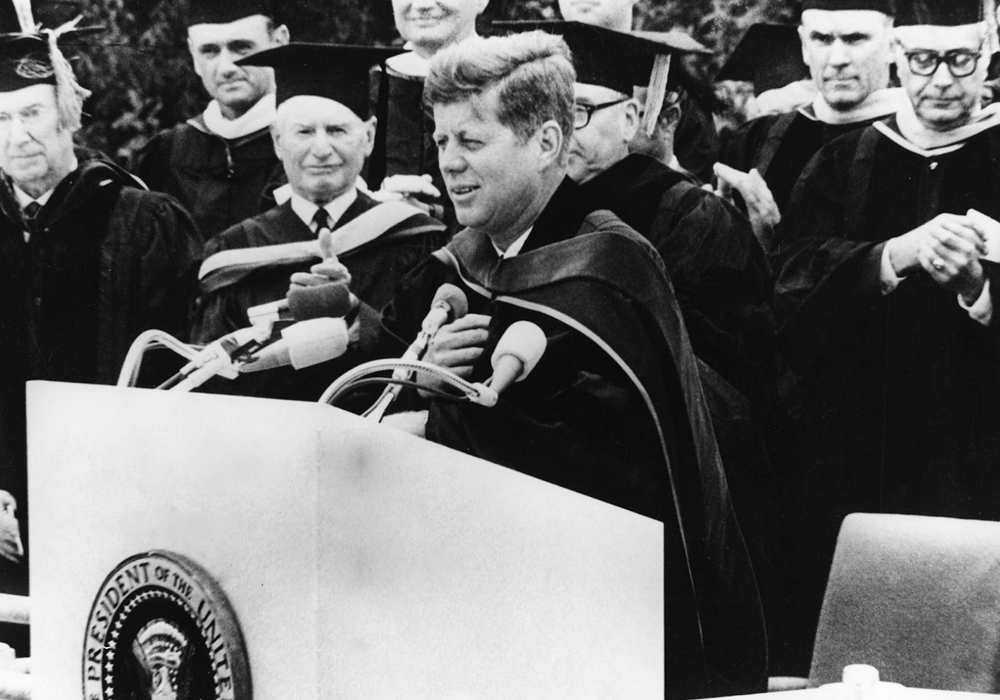
In the early 1970s, with legislative approval, San Diego State College became San Diego State University.
Leading the university during the 1970s were Acting President Donald E. Walker (1971-1972), President Brage Golding (1972-1977), Acting President Trevor Colbourn (1977-1978) and President Thomas B. Day, whose tenure spanned 1978 to 1996.
Day championed the teacher-scholar model for faculty and promoted research across campus. His vision led the way for new areas of exploration and an increase in research grants and contracts awarded to SDSU faculty.
In 1996, Stephen L. Weber became the university's seventh president, presiding over the university's significant gains in student preparation and graduation, study abroad, philanthropy, research and other areas of excellence.
Elliot Hirshman served as president of San Diego State University from 2011 to June 30, 2017 – a period in which SDSU raised its profile as a major public research university. SDSU created a new strategic plan, raised over $800 million for scholarships and new initiatives and programs, established and endowed the Susan and Stephen Weber Honors College, and built and remodeled facilities across campus.
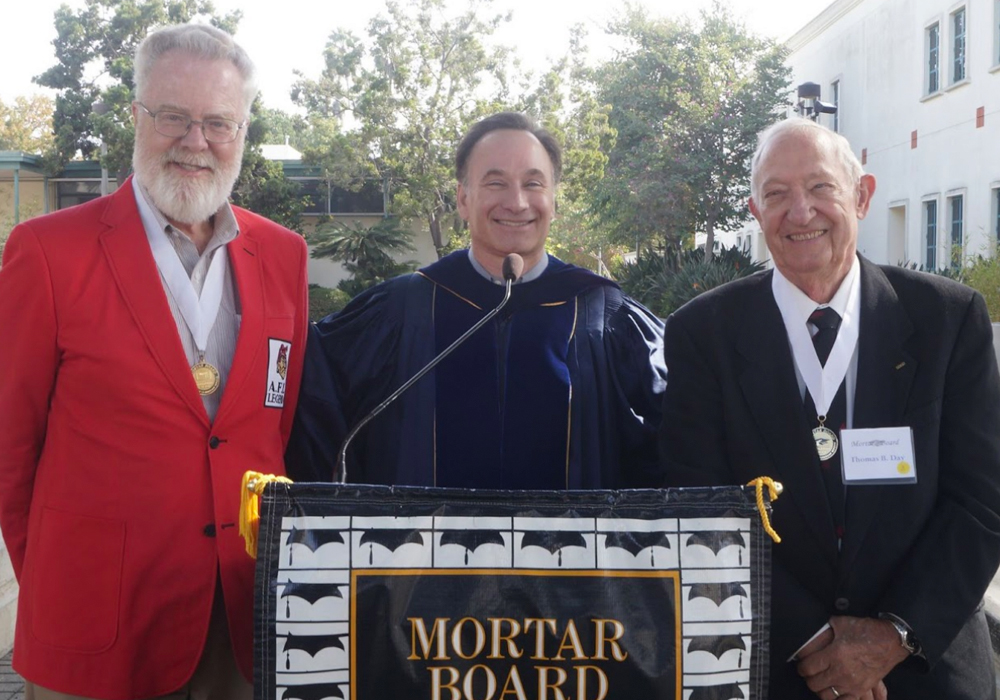
Sally Roush – a former senior vice president at SDSU – began her term as interim president on July 1, 2017. She is the first woman to be named president of San Diego State University.
On Jan. 31, it was announced that Adela de la Torre, vice chancellor for student affairs and campus diversity at University of California, Davis, would become the university's ninth president in late June 2018, and the first woman to be named permanent president of SDSU.
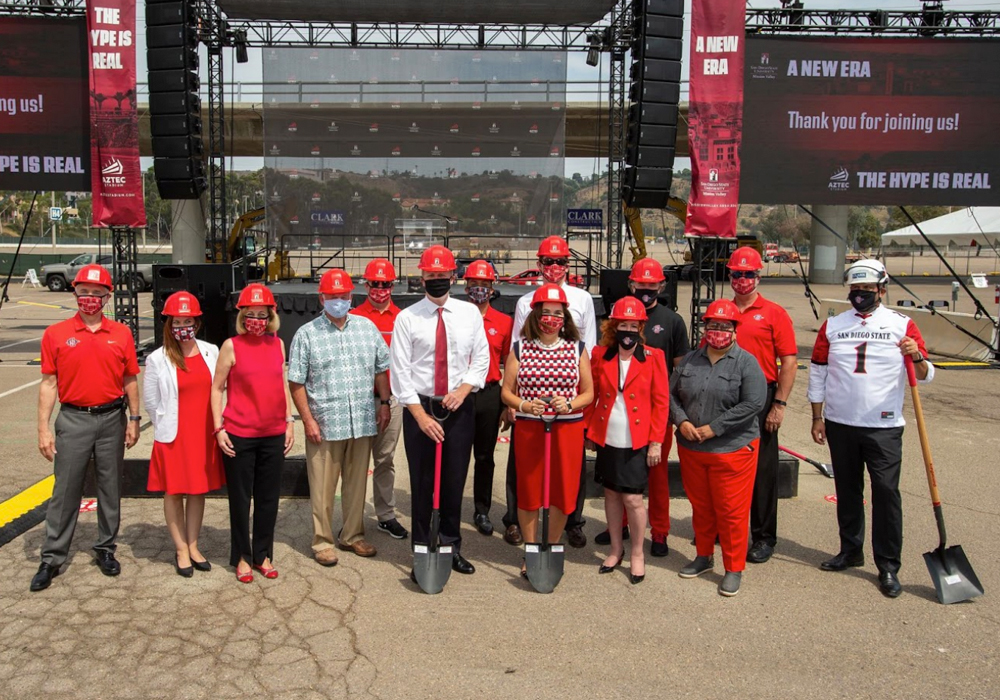
In her first several years as president, de la Torre is credited with leading new initiatives that leverage the university’s historic legacy to elevate the campus into a new era of excellence. Under de la Torre’s tenure, the university launched a new, 5-year strategic plan, saw record increases in philanthropy, diversified the university’s funding and auxiliary sources to balance revenue streams and expanded investments in SDSU Imperial Valley. The university also saw improvements in student retention and graduation rates and closed equity gaps across several categories through expanded investments in advising, innovative use of virtual technologies, support programs, student aid initiatives, health and well-being offerings and other efforts.
De la Torre led the university through its response plan during the COVID-19 pandemic, launching and sustaining SDSU Flex, a flexible repopulation, instruction and business continuity plan.
The purchase, groundbreaking and initial construction of SDSU Mission Valley also began under de la Torre’s tenure. A critical component of SDSU Mission Valley is the innovation district, which is important to growing the university’s already unique status as a high research-activity, community-engaged, border-connected, emerging R-1 institution.
SDSU Today
San Diego State University can take pride in more than a century of achievement in education, research and service.
Located near the U.S.-Mexico border, SDSU is the top California State University campus for federal research support and is an active research public university in California. Students participate in transformational research, international experiences, sustainability and entrepreneurship initiatives, internships and mentoring, and have access to a diverse range of student life opportunities. SDSU, a federally-designated Hispanic-serving Institution residing on Kumeyaay land, is known for its long-standing efforts advancing diversity and inclusion, and for its Division I athletic program.
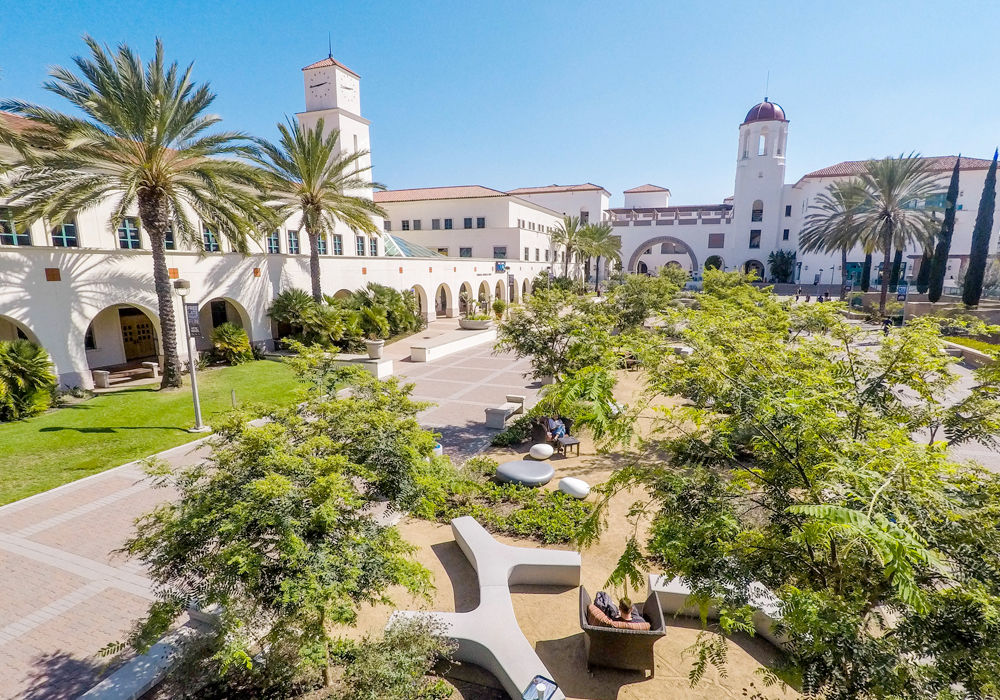
With an enrollment of more than 39,000 students, SDSU is increasingly becoming a top choice for undergraduates as evidenced by the record number of applications received each year. SDSU is consistently ranked by national organizations and publications, to include those such as Forbes, Fortune and U.S. News & World Report, for students studying abroad, its academic excellence, diversity and inclusion initiatives and academic excellence. The university is home to highly ranked graduate programs in business, engineering, public health, psychology, fine arts, biological sciences, public affairs, entrepreneurship, education and speech, language, and hearing sciences. Overall, SDSU students can choose from bachelor's degrees in n 97 areas, master’s degrees in 87 fields and 25 doctoral programs, with additional certificates and programs at regional microsites.
SDSU also has locations at SDSU Imperial Valley and SDSU Georgia in Tbilisi.
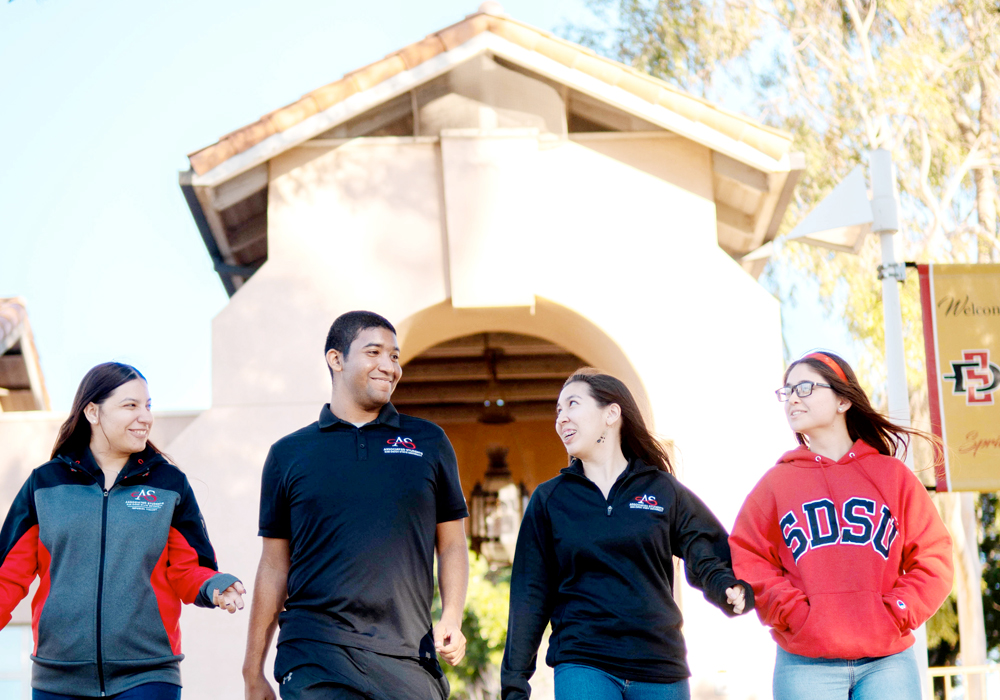
SDSU Imperial Valley offers 10 bachelor's and two master's degrees, including a nationally-acclaimed teacher education program, providing a uniquely intimate educational experience. The university, with locations in Brawley and Calexico, offers students the advantages of small classes with convenient accessibility to a dedicated faculty and staff. Interactive videoconferencing provides students at the Calexico and Brawley sites the opportunity to participate in classes broadcast live from San Diego. Students at SDSU Imperial Valley can be involved in a rewarding campus life through its student clubs, Associated Students, guest lectures, art exhibits and musical events. The Brawley location is 24 miles north of SDSU Imperial Valley, Calexico.
SDSU Georgia, a U.S. Department of State-funded program, is a representation of San Diego State University in Tbilisi, Georgia. The university offers internationally accredited Bachelor of Science programs in the fields of science, technology, engineering, and mathematics in the Republic of Georgia.
Campus Growth and Expansion
Perhaps the most visible evidence of SDSU's growth is in the physical additions to SDSU, SDSU Mission Valley and the developing Sciences and Engineering Laboratories at SDSU Imperial Valley, and its continued commitment to providing a state-of-the-art learning environment for students, faculty and staff. The university has reimagined and renovated academic buildings and complexes, the library, labs and residence halls. The Engineering and Interdisciplinary Sciences Complex houses instructional areas and provides ample capacity for collaborative space and labs for interdisciplinary teams and SDSU's entrepreneurship centers.
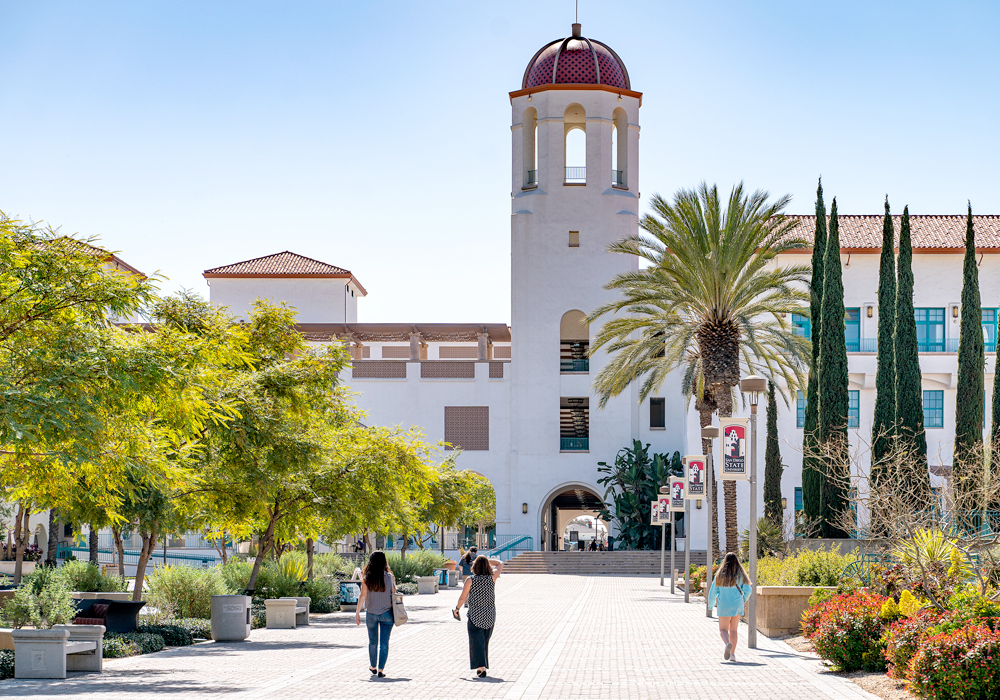
The Conrad Prebys Aztec Student Union serves as the center of SDSU university life. It contains many sustainable and energy-efficient features and has obtained LEED-certified platinum status for both building features and operations. In addition, the Parma Payne Goodall Alumni Center welcomes alumni back to campus and provides a professional meeting and events venue for the entire San Diego region.
In 2020, the university broke ground on SDSU Mission Valley, which is designed as a vibrant, mixed-use, medium-density development that is transit-oriented, and expands the university’s educational, research, entrepreneurial, and technology transfer programs. SDSU Mission Valley includes Snapdragon Stadium and the 34-acre River Park. At full build out, the site will also include an innovation district, transit, retail, housing, and the development of more than 80 acres of community parks and open space.
In 2025, the university was officially classified as an R1 research institution, the highest distinction given to doctoral universities in the Carnegie Classification of Institutions of Higher Education. The university is among an even smaller number of institutions that not only excel in teaching and diversity, but also hold designations as both a Hispanic-Serving Institution and an Asian American and Native American Pacific Islander-Serving Institution.
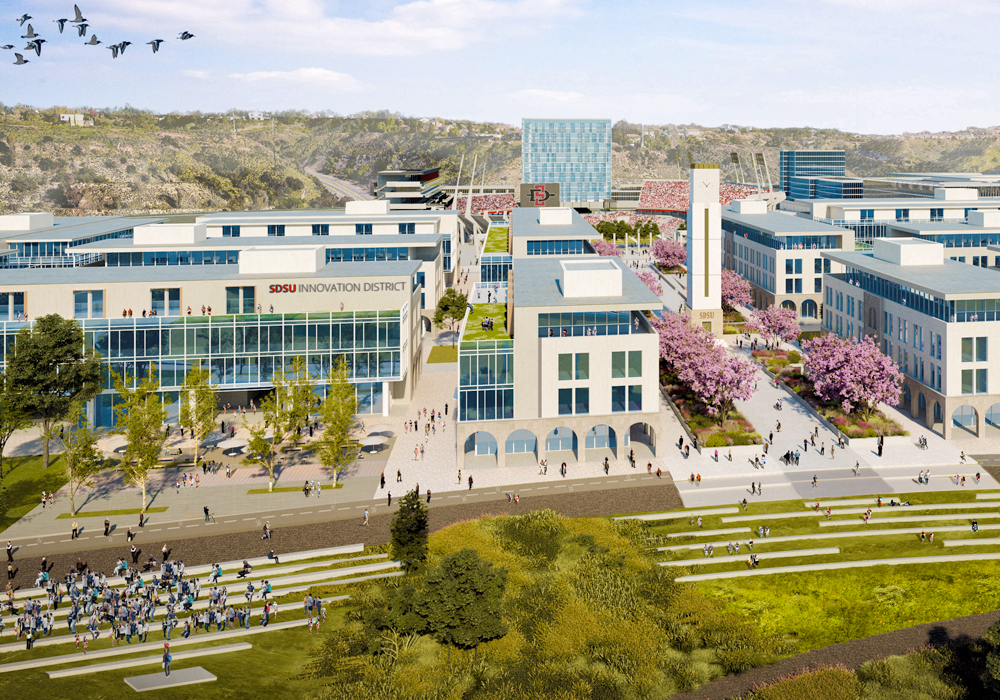
Notable Alumni
Beyond accolades and campus expansion, SDSU remains, as always, most proud of its alumni family, more than 500,000 strong, including:
- Hollywood producer and Lucasfilm president Kathleen Kennedy
- Former Federal Trade Commission chair Timothy Muris
- Former Air Force Chief of Staff Gen. Merrill A. "Tony" McPeak
- Former San Diego Mayor Kevin Faulconer
- Former San Diego County Supervisors:
- Greg Cox
- Dianne Jacob
- Ron Roberts
- Bill Horn
- Astronaut and former Johnson Space Center director Ellen Ochoa, a Presidential Medal of Freedom recipient
- Costco co-founder Jim Sinegal
- Linda A. Lang, former CEO of Jack in the Box restaurants
- Ralph Rubio, founder and chairman of Rubio’s Fresh Mexican Grill.
- Entertainers:
- Gregory Peck
- Marion Ross
- Julie Kavner
- Kathy Najimy
- Baseball Hall of Famer Tony Gwynn
- Former Major League Baseball manager Bud Black
- U.S. Open winner and former PGA tour golfer Gene Littler
- America's Cup skipper Dennis Conner
- Washington Nationals pitcher Stephen Strasburg
- Basketball star Kawhi Leonard
The success of these individuals and hundreds of thousands of other SDSU alumni attest to the motivating influence of their alma mater. From modest beginnings, San Diego State University has evolved into a premier center of education, research and service.

